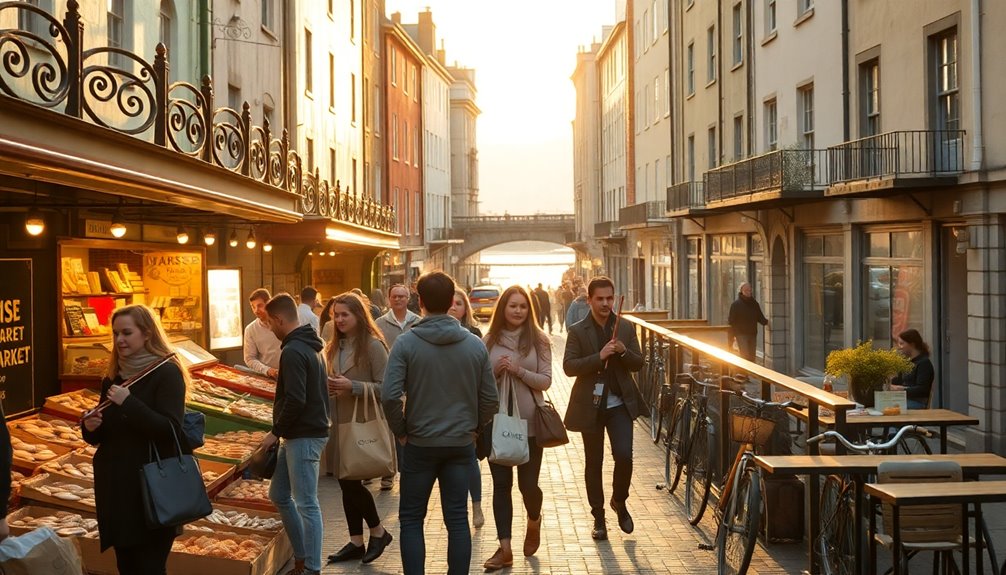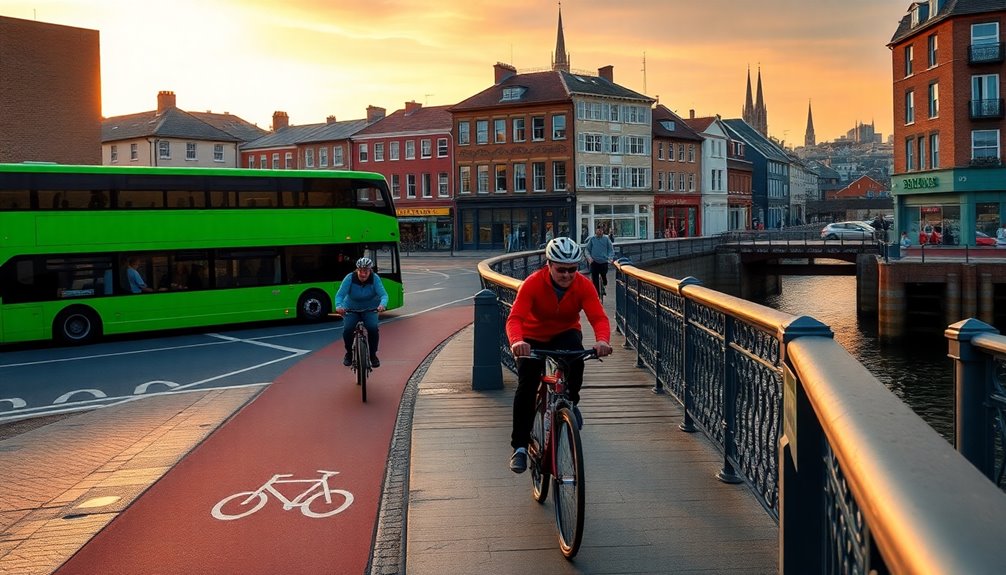
You’ll settle into Cork fast if you know the essentials: get a local SIM and Leap card, open a student-friendly bank account, and register with your campus services and a GP. Look for cheap shared houses via uni boards and Facebook groups, and learn main bus and bike routes to save time and money. Join clubs and language exchanges to meet people and check student job boards for part-time work. Keep going to pick up housing, transport, and safety tips.
Highlights
- Register with your college, get campus maps, emergency contacts, and join student groups for local tips and support.
- Secure affordable accommodation via university boards, Facebook groups, or short-term student lets close to transport links.
- Get a Leap Card for cheaper buses/trams, learn main routes, and consider cycling with a helmet and sturdy lock.
- Register with a local GP, know CUH/urgent-care locations, and keep health and insurance documents accessible.
- Open a student bank account, choose a mobile plan with student deals, and budget by cooking and using student discounts.
Arriving and Settling In: First-Day Essentials for International Students
Wondering what to tackle on your first day in Cork? Start with a simple first day checklist: activate your SIM, exchange some currency, and confirm transport routes from the station to your neighbourhood. Swing by a local amenities hub — a supermarket, pharmacy, and a café — to get essentials and a feel for the area. Register with your school, collect maps, and note emergency contacts. Take a short walk to orient yourself and breathe; freedom means choosing your pace. Keep receipts and photos of important documents, and connect with fellow students for tips and company as you begin.
Finding Student Accommodation Quickly and Affordably
To find affordable housing in Cork, start by looking for cheap shared houses where you can split rent and bills with fellow students. If you need something immediately, short-term student lets and sublets give you flexibility while you search for a longer-term spot. Use university noticeboards, student Facebook groups, and trusted letting sites to compare options quickly.
Cheap Shared Housing
If you’re on a tight budget and need a place fast, shared housing is the most practical option for students in Cork — it cuts rent and bills, helps you meet flatmates, and keeps you close to city life. Look for shared living adverts on student Facebook groups, Daft, and local noticeboards; reply quickly and view in person. Ask about bills, internet, deposit split, and house rules. Prioritise location and transport links over luxury. Meet potential flatmates to check vibes. Use budget tips: split groceries, rotate chores, and agree a simple written rent/bill plan to avoid conflicts.
Short-Term Student Lets
When you need a place fast but don’t want to lock into a long lease, short-term student lets are a flexible, often affordable option that keeps you close to campus while you search for something more permanent. You can grab furnished rooms or whole flats on short term leases, ideal between semesters or during internships. Focus on reliable listings, clear move-in dates, and inclusive bills to avoid surprises. Explore student neighborhoods like Shandon or Cork city centre for walkable access to classes and cafés. Trust your instincts, read contracts carefully, and keep options open so you stay mobile and independent.
Navigating Cork Public Transport and Biking Routes

Looking for the easiest way to get around Cork? You’ll love the mix of reliable public transport and pleasant biking routes that let you explore freely. Buses cover the city and suburbs; get a Leap card for cheaper fares and hop on or off as you please. Tram lines and regional trains link key spots and nearby towns — handy for weekend trips. Cork’s bike lanes and quieter streets make cycling a fast, flexible option; bring a sturdy lock and helmet. Combine transit and cycling to save time, money, and experience Cork on your own terms.
Opening a Bank Account, Getting a SIM, and Handling Admin
Because you’ll need easy access to money, phone service, and official documents, sorting your bank account, SIM card, and paperwork soon after arrival makes life much smoother. You’ll compare banking options—traditional branches or digital banks—checking fees, online tools, and student-friendly accounts. Bring ID, proof of address, and your acceptance letter. For connectivity, choose from pay-as-you-go or contract mobile plans; pick providers with good student deals and local coverage. Register with your institution for any required documentation, get a PPS number if you’ll work, and keep copies of everything. Stay organized, ask questions, and you’ll stay independent and ready to explore Cork.
Essential University Services, Libraries, and Study Spaces
You’ll want to check library opening hours first so you can plan study sessions around evenings and weekends. Most campuses offer both quiet zones for focused work and separate group rooms you can book for projects or conversation practice. Knowing where these spaces are and how booking systems work will save you time and help you study more effectively.
Library Opening Hours
If you need a quiet place to study or access course materials, the university libraries keep hours tailored to student schedules, with extended evenings during term time and reduced hours on weekends and holidays. You’ll find timetables online and on noticeboards, so you can plan around lectures and social life. Check special opening times for exam weeks and semester breaks. Many libraries list library resources and study programs, plus late-night openings or 24-hour access at exam peaks. You’re free to drop in, reserve items, or book short slots — just follow borrowing rules and ID requirements to avoid fines.
Quiet and Group Spaces
Alongside opening hours, knowing where to study — quietly alone or with a group — makes planning your week a lot easier. You’ll find university libraries with designated silent floors for focused reading and reservable group study rooms with screens and whiteboards. If you crave a relaxed vibe, explore quiet cafes near campus that welcome laptops during off-peak hours. Check booking systems and noticeboards for peak times, and reserve rooms in advance when deadlines loom. Mix solo sessions in serene corners with collaborative blocks in bright, equipped spaces so you keep freedom to choose how and where you work.
Quick Ways to Meet People: Clubs, Language Exchanges, and Events
Because meeting people in Cork is easiest when you step into shared activities, start with clubs, language exchanges, and local events that match your interests—sports teams, book clubs, conversation cafés, and pub quiz nights all attract friendly crowds. You’ll find language meetups for practice and cultural events that celebrate music, art, and food—great ways to connect fast. Try volunteer projects, university societies, or casual meetup apps to filter by vibe. Be open, show curiosity, and follow up with new contacts. Regular attendance and light invitations to coffee or walks will turn brief encounters into lasting friendships.
Affordable Eating, Cooking Tips, and Best Student Food Spots
1 simple rule will save you money: cook more, eat out less. You’ll master budget meals by shopping local markets, sharing bulk buys with flatmates, and learning quick student recipes like one-pot pasta, stir-fries, and hearty soups. Pack lunch to class, freeze portions, and swap meals with friends to stretch ingredients and tastes. For eating out, scout student-friendly cafes, food trucks, and campus discounts — follow socials for weekday deals. You’ll enjoy freedom by choosing when to cook or dine, keeping costs low without sacrificing social life or flavor. Small habits add up fast.
Part-Time Work, Internships, and CV Tips for Cork Employers
While juggling classes, you can pick up part-time work or internships in Cork that boost your CV and your bank balance, especially if you target roles related to your studies like marketing, hospitality, tech support, or research assistantships. Seek part time opportunities through university job boards, local cafés, startups, and recruitment fairs. Highlight transferable skills—communication, time management, software—on a concise CV tailored to Cork employers. Emphasise internship benefits like hands-on experience, networking, and references. Be proactive: cold-email small businesses, ask lecturers for leads, and prepare a short cover note. Balance work and study to keep your freedom and progress.
Safety, Health Services, and Practical Local Support

Although Cork is generally a friendly and safe city, it’s smart to stay aware of your surroundings—especially at night and in busy tourist spots—and take simple precautions like keeping valuables out of sight, using well-lit routes, and sharing your plans with friends. You’ll find reliable emergency contacts listed at Garda stations and hospital sites; save numbers to your phone and know 112/999 for urgent help. For health care, register with a GP, understand your health insurance coverage, and locate the nearest CUH or urgent care. Local student services, embassy assistance, and community centres offer practical support and free advice.
Some Questions Answered
How Do I Register to Vote as an International Student in Ireland?
You can’t vote in Irish national elections unless you’re an Irish citizen, but EU and some local voting rights exist; to check voter registration as international students, contact your local authority or register online for local elections if eligible. Bring ID, proof of address and immigration status. International students should verify eligibility early, follow deadlines, and ask student services for help—staying informed keeps your freedom to participate where allowed.
Can I Bring My Pet While Studying in Cork?
Yes — you can bring a pet, but you’ll need to plan. You’ll want to secure pet friendly accommodations early, check landlord or uni rules, and arrange vaccinations, microchipping, and pet passports if coming from abroad. Explore local pet services for vets, groomers, and daycare, and budget for deposits or extra fees. Staying flexible helps you keep freedom to travel and study while giving your companion the care they need.
What Cultural Customs Should I Know for Irish Social Events?
You’ll want to be open, curious, and ready for surprises. Expect Irish hospitality — people’ll offer food, stories, and a warm welcome; accept a drink or a round of introductions. Respect traditions: listen during Traditional music sessions, clap between tunes, and don’t interrupt performers. Be polite, arrive on time for some events but relaxed about pacing, and avoid heavy partisan topics. Join in, smile, and enjoy the communal spirit.
Are There Student Discounts for Concerts and Festivals in Cork?
Yes — you’ll often get student discounts for concert tickets and festival access in Cork. Bring a valid student ID; discounts pop up at box offices, online checkout with student verification, or through college societies. Keep an eye on student email lists, campus noticeboards, and social media for promo codes. Smaller venues and local festivals are especially flexible, so don’t be shy about asking at the door or contacting organizers for reduced rates.
Where Can I Store Luggage During Semester Breaks?
You’ll find luggage storage options all over town — from lockers at train and bus stations to private companies and some university semester break facilities — so you won’t be hauling bags forever! Check your college first for discounted or on-campus storage during breaks. Private services like Stasher or local luggage lockers near the city centre offer flexible plans. Always compare prices, insurance, and opening hours to match your freedom-seeking travel plans.
Summing Everything Up
You’ve got the map now — plug in, breathe, and let Cork unfold like a well-loved book. Between tramlines, cozy cafes, late-night study nooks and friendly faces, you’ll stitch together a new routine that feels like home. Get practical with admin, stay curious, join clubs, and say yes to invites; every small choice is a page in your Cork story. Before you know it, the city will feel familiar and yours.
